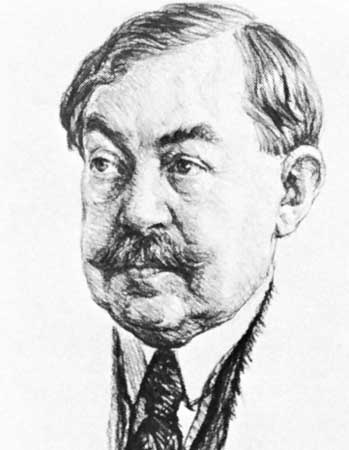Painlevé, Paul
French politician and mathematician
born December 5, 1863, Paris, France
died October 29, 1933, Paris
 French politician, mathematician, and patron of aviation who was prime minister at a crucial period of World War I and again during the 1925 financial crisis.
French politician, mathematician, and patron of aviation who was prime minister at a crucial period of World War I and again during the 1925 financial crisis.Educated at the École Normale Supérieure (now part of the Universities of Paris (Paris I–XIII, Universities of)), Painlevé completed his thesis on a problem in complex (complex number) function theory at the University of Göttingen (Göttingen, University of) in Germany. He presented his thesis in Paris in 1887 and the same year became a professor at Lille. In 1892 he moved to Paris, where he taught at the École Polytechnique and the Collège de France (France, Collège de) (1896). He was a distinguished mathematician, and among his awards were the Grand Prix des Sciences Mathématiques (1890) and the Prix Bordin (1894). In 1895 he was invited by King Oscar II of Sweden and Norway to lecture at the University of Stockholm. His Stockholm lectures, Leçons sur la théorie analytique des équations differentielles (“Lessons on the Analytical Theory of Differential Equations”), which were published two years later, concluded with some important contributions to the three-body problem. He returned to the École Normale Supérieure to teach in 1897.
Painlevé's interest in dynamics led him to a special interest in the infant science of aviation, and he became a theoretician of heavier-than-air flight. He was one of the first Frenchmen to fly with Wilbur Wright (Wright, Wilbur and Orville), at Auvours in 1908, and the following year he created the first course in aeronautical mechanics at the École Aéronautique.
Becoming interested in politics, Painlevé was elected to the Chamber of Deputies from a Paris constituency in 1906. He served as minister of education and minister of inventions in the wartime government of Aristide Briand (Briand, Aristide), and, as war minister from March to September 1917, he made the controversial decision to replace General Robert-Georges Nivelle (Nivelle, Robert-Georges) with General Philippe Pétain (Pétain, Philippe) after the costly failure of Nivelle's offensive in May. In September 1917 he formed his own ministry, and the following month he agreed to the establishment of the Supreme Allied Council at Versailles, choosing as the French representative General Ferdinand Foch (Foch, Ferdinand), who later became Allied commander. Painlevé resigned in November, however, and was succeeded as prime minister by Georges Clemenceau (Clemenceau, Georges).
Painlevé was one of the founders of the Cartel des Gauches (Gauches, Cartel des), a coalition of socialists and radicals, which defeated the rightist Bloc National in the general elections of 1924. He became prime minister in April 1925 but resigned in November because neither his ministers nor French financial interests could agree on a solution to the financial crisis engendered by the devaluation of the franc. Subsequently he served as war minister in the governments of Aristide Briand and Raymond Poincaré (Poincaré, Raymond) and was air minister in 1930–31 and 1931–32.
Although not remembered as an outstanding political leader, Painlevé was a brilliant mathematician. He is remembered for his work in transformations and, especially, in differential equations (differential equation) and the theory of functions. He was elected a member of the French Academy of Sciences (Sciences, Academy of) in 1900.
- Zayas y Sotomayor, María de
- Zaydīyah
- Zaysan, Lake
- Zaytūnah, Al-
- zazen
- Zaʿtar, Tall al-
- Zaḥlah
- Zbigniew Herbert
- Zbigniew Morsztyn
- Zbigniew Oleśnicki
- Zdarsky, Matthias
- Z D Mangoaela
- Zea
- Zealand
- Zealot
- Zeami
- zebra
- zebra fish
- zebra swallowtail butterfly
- Zebrina
- Zebrzydowski Rebellion
- Zebulon B. Vance
- Zebulon Montgomery Pike
- Zebulun
- Zechariah